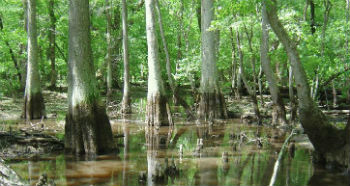RALEIGH – In what has become an annual rite, the N.C. General Assembly Friday passed yet another package of regulatory changes that weaken environmental protections. Small pockets of coastal wetlands were in the crosshairs this time.
In every session since taking control of the legislature in 2010, Republicans have passed what they call “regulatory reform” bills that have rolled back or done away with environmental laws. Such steps are needed, they have said, to attract new businesses to the state and to allow those already here to create more jobs. Critics say the changes weaken the state’s ability to protect the environment and are giveaways to business and industry
Supporter Spotlight
 Small pockets of wetlands along the coast are left virtually unprotected under a bill passed by the legislature. Photo: Dan Murphy, Bay Journal |
The latest bill – called the Regulatory Reform Act of 2014 — was the result of a late-session compromise that incorporates pieces from two competing state House and Senate bills that had passed earlier in the session.
Most of the provisions were in either of those bills or had been recommended by earlier legislative study committees, but some were added or changed during the negotiations on the compromise bill.
One provision in the bill that passed had been kicking around the legislature all session in one form or another. It virtually eliminates state protection of small pockets of coastal wetlands that aren’t directly connected to navigable water bodies. Developers needed a state permit if they wanted to fill or ditch a third of an acre of these so-called “isolated wetlands” east of Interstate 95. The bill raises the threshold requirement for a permit to an acre. West of the interstate, the permit trigger rises from a tenth of an acre to a third of acre. Under the old rules, developers were required to restore or protect twice the amount of wetland acres they destroyed. That mitigation requirement is reduced to 1:1 in the new bill.
State records show that all of the permits for isolated wetlands in the coastal plain have been for less than an acre.
The bill also requires that the N.C. Department of Environment and Natural Resources to study the definition and regulation of isolated wetlands and report to the legislature by Nov. 1.
Supporter Spotlight
“In what seems to have become an annual tradition, the bill contains a number of provisions sought by regulated industry at the expense of the environment,” said Dustin Chicurel-Bayard, communications director of the N.C. Sierra Club. “This year’s regulatory giveaways primarily benefit coastal developers at the expense of water quality.
“The isolated wetlands section is a giveaway to developers, especially for those in Eastern N.C,” he went on. “Builders east of I-95 will now be allowed to destroy isolated wetlands of one acre or less without having to do mitigation, as is now required.”
Another key coastal provision added to the compromise bill extends exemptions from coastal stormwater rules to land contiguous with certain properties that are already grandfathered. The provision would extend the exemptions to “development activity conducted on a contiguous property or properties under a subdivision plat approved by the local government prior to July 3, 2012.”
The bill also changes the effect of contested permits under the N.C. Coastal Area Management Act. Under current law, permits are suspended in the event of a third-party challenge until the challenge is reviewed. The new provision allows the permit to remain in effect until a stay is issued by a court or administrative law judge.
Other coastal-related provisions in the bill include:
- Amendments to state law on transplanting oysters and clams from permitted aquaculture operations and public bottoms to private beds
- The requirement of an annual report and assessment by DENR and the N.C. Department of Agriculture and Consumer Services on local government ordinances that “impinge or interfere with areas regulated by those departments”
- A prohibition preventing the state Coastal Resources Commission from establishing any new inlet hazard areas for a state port that has a channel maintained by the Corps of Engineers and the repeal of any inlet hazard areas where the inlet has been closed for more than 15 years or moved because of shoreline migration
- Establishment of the Senator Jean Preston Marine Shellfish Sanctuary, which requires DENR and the N.C. Division of Marine Fisheries to designate an area of Pamlico Sound for the sanctuary and develop a management plan and budget by Dec. 1 that includes recommendations for statutory and regulatory changes needed to expedite the expansion of shellfish restoration and harvesting
- Elevating to a Class H felony stealing a Venus flytrap from private or public property specifically to “dig up, pull up, take or carry away or aid in such”
 Rep. Paul Luebke |
 Rep. Ruth Samuelson |
Another major change in the bill strengthened the so-called Hardison Amendments. The amendments, named for a series of similar environmental requirements in the 1980s, limit the state’s ability to impose tighter environmental standards than the federal government. A provision in the act requires that all rules that fall in that category be subject to legislative review.
The bill passed the Senate quickly by a vote of 35-1, but slowed down in the House over concerns about environmental provisions or one that allows community colleges to teach brewing of beer. It eventually passed by a vote of 64-27.
During debate on the bill on the floor of the House, Rep. Paul Luebke, D-Durham, questioned why the state would want to handcuff its regulators from enacting regulations tougher than federal requirements, when it was likely that future coal ash legislation would do just that. He said the bill overall weakens the state’s ability to protect the environment.
Rep. Ruth Samuelson, R-Mecklenberg, one of the floor managers of the legislation said the Hardison Amendment provision is meant to ensure legislative review in the case of rules that are more stringent than federal rules. She said more rules are likely to come before future legislatures as a result of the change.
House leaders said the bill strikes a balance between the need for business expansion and protections. House Speaker Pro Tem Paul Stam, R-Wake, said the bill likely does more for the economy than tax reform or incentives. The bill, he said, “sets people free to do business in a business-like way while protecting the environment.”
As of the weekend, state House and Senate leaders are still trying to work out how to conclude this year’s session. On Friday, the Senate passed three separate adjournment provisions, allowing the House the option of agreeing to return in mid-November to take up coal ash legislation and Medicaid reform or adjourning and leaving both issues for the next session in January.
The House is scheduled to reconvene today at 5 p.m. to work through the remaining bills. House Speaker Thom Tillis, R-Mecklenburg, said Friday that the House would opt to not come back for additional work this year and close the session out for good.







